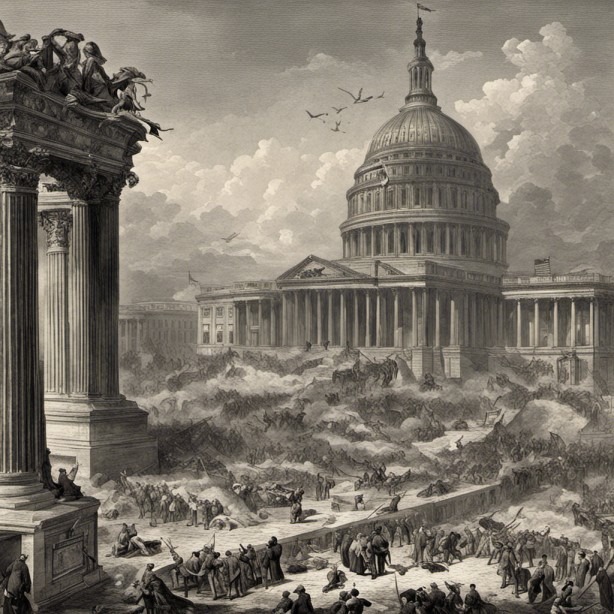
The Fall and Decline of the American Empire: A Comprehensive Analysis
Sept 24, 2023
Introduction
Once a beacon of economic and political power, the American Empire now stands at a crossroads, its destiny intertwined with the fate of the global economy. This thought-provoking exploration delves into the multifaceted challenges that have catalyzed ‘The Fall and Decline of the American Empire.’ With a keen focus on real-world examples, we illuminate the ever-evolving contours of global power dynamics, where the American economy plays a pivotal role. Join us in this discourse as we navigate the twists and turns of changing world order.
The Rise of Iran and Russia: A Challenge to American Hegemony
The geopolitical landscape is undergoing a significant transformation, with the rise of Iran and Russia posing a formidable challenge to American hegemony. The recent decision by Russia to supply Iran with S-300 air defence missile systems, as denounced by Israel, is a clear indication of the shifting power dynamics. This move, seen as a direct result of Iran’s newfound “legitimacy” following nuclear talks, is a stark example of the decline of American influence in global politics.
This development is not an isolated incident but part of a broader trend. Russia’s decision to lift the ban on supplying Iran with sophisticated weaponry is a testament to Tehran’s growing clout on the international stage. It also underscores Russia’s strategic interests in the Middle East and its willingness to challenge the status quo.
Moreover, this move signifies a broader realignment of alliances. Russia, a key supplier of weapons to the Arab world, is increasingly cooperating with nations that do not recognize the Jewish state. This development is a cause for concern for Israeli leaders and a clear indication of the waning influence of the United States in the region.
Therefore, the rise of Iran and Russia represents a significant shift in the global balance of power. As these nations assert their influence, the American Empire’s decline becomes increasingly apparent. This shift is reshaping the geopolitical landscape, challenging long-standing alliances, and raising critical questions about the future of American hegemony.
The Escalation of Indirect Wars: The USA’s Losing Game
The escalating tensions between Russia, China, and the USA, particularly in the Middle East, further underscore the decline of American dominance. The USA’s inability to control the actions of Israel, Iran, and Syria, and the increasing assertiveness of Russia and China, signal a significant shift in global power dynamics.
This escalation is a series of isolated incidents and a manifestation of a broader geopolitical trend. The indirect wars are increasingly becoming arenas where the USA’s traditional dominance is being challenged. The USA’s inability to decisively influence the outcomes in these regions is a testament to its waning power.
Moreover, the assertiveness of Russia and China is not limited to their military actions. They also make strategic moves in the economic and diplomatic arenas, further undermining the USA’s position. The USA’s traditional allies increasingly have to navigate this new geopolitical landscape, often making decisions that do not align with the USA’s interests.
The USA’s losing game in these indirect wars is not just about losing its military dominance. It is also about erasing its ability to shape global politics and economics. As the USA grapples with these challenges, the fall and decline of the American Empire become increasingly apparent.
The Rising Cost of Elder Care: A Domestic Challenge
The steep rise in elder care costs, with the median bill for a private room in a nursing home now at $91,250 a year, is a domestic issue that further strains the American economy. This escalating financial burden clearly indicates the internal challenges contributing to the decline of the American Empire.
This issue is not just about the financial burden on families and the government. It also reflects deeper societal and economic challenges. The ageing population, coupled with the rising cost of healthcare, is putting immense pressure on the American social security system. The government’s inability to effectively address this issue is a testament to the systemic problems plaguing the American economy.
Moreover, the rising cost of elder care also indicates the country’s broader economic inequality. As the cost of care continues to rise, it is becoming increasingly unaffordable for a significant portion of the population. This growing divide between the rich and the poor is another factor contributing to the decline of the American Empire.
Therefore, the rising cost of elder care is not just a domestic challenge. It is a reflection of the broader economic and societal issues that are contributing to the fall and decline of the American Empire.
The Emergence of the Asia Infrastructure Investment Bank: A Blow to US Economic Leadership
Establishing the Asia Infrastructure Investment Bank (AIIB), led by China, is a significant blow to the USA’s role as the global economic leader. The AIIB’s ability to attract U.S. allies, despite the Obama administration’s efforts to discourage membership, is a clear sign of the USA’s diminishing influence.
This development is not just a setback for the USA; it’s a manifestation of the shifting global economic landscape. The AIIB represents a new economic order where emerging economies, led by China, play a more prominent role. This shift is challenging the traditional financial institutions, such as the World Bank and the International Monetary Fund, where the USA has held significant sway.
Moreover, the AIIB’s growth and its ability to attract U.S. allies underscore the waning influence of the U.S. in global economic governance. Despite the USA’s efforts to discourage membership, several traditional allies, including the United Kingdom, Germany, and Australia, have joined the AIIB. This development clearly indicates the USA’s declining ability to shape global economic policies.
Therefore, the emergence of the AIIB is not just a blow to the USA’s economic leadership. It reflects the broader shifts in the global economic order that are contributing to the fall and decline of the American Empire.
The Deepening Military Ties Between China and Russia: A Threat to American Security
The deepening military ties between China and Russia, particularly in the wake of the Ukraine crisis, pose a significant threat to American security. The cooperation between these two powers, particularly in developing advanced defence technologies, clearly indicates the decline of American military dominance.
This deepening alliance is not just a response to the immediate geopolitical situation. It is a strategic move aimed at reshaping the global balance of power. The cooperation between China and Russia extends beyond the military sphere. It includes economic, technological, and diplomatic collaborations to challenge American hegemony.
Moreover, the development of advanced defence technologies, such as the S-300 air defence missile systems, underscores the technological prowess of these two nations. These advancements pose a significant challenge to the American military, which has long relied on its technological superiority.
Therefore, the deepening military ties between China and Russia represent a significant shift in the global power dynamics. The American Empire’s decline became increasingly apparent as these two nations strengthened their alliance. This shift is reshaping the geopolitical landscape, challenging long-standing partnerships, and raising critical questions about the future of American security.
The Loss of US Role as the World’s Economic Leader: A Turning Point
The USA’s failure to maintain its role as the world’s economic leader, as highlighted by former White House economic advisor Larry Summers, is a turning point in the decline of the American Empire. The USA’s inability to adapt to the changing global financial architecture, coupled with political pressures from both the right and the left, has rendered its economic leadership increasingly dysfunctional.
This failure reflects deeper issues plaguing American politics and economics. The hyper-partisanship in Washington has made it difficult for the USA to develop coherent, long-term strategies. As a result, the USA has been unable to effectively reform institutions like the IMF to reflect contemporary economic realities.
Meanwhile, the changing nature of global growth has further undermined America’s position. Emerging economies, particularly in Asia, now account for over half of global GDP. However, the USA has struggled to develop partnerships with these rising powers and address their policy priorities.
Therefore, the USA’s inability to adapt goes beyond any single administration. It is a symptom of systemic political dysfunction that has eroded America’s capacity for global economic leadership. As this turning point highlights, effective governance is now critical for the USA to maintain influence amidst changing global dynamics.
Conclusion:
The fall and decline of the American Empire is a complex issue, influenced by many factors both domestically and internationally. The rise of new global powers, the escalation of indirect wars, the increasing cost of elder care, the emergence of new economic institutions, and the deepening military ties between potential adversaries all contribute to this decline. As these trends continue, the world is witnessing a significant shift in global power dynamics, marking the fall and decline of the American Empire.
While the decline has been precipitated by numerous political, economic and social challenges, both internal and external, the future is not predetermined. The fate of an empire depends on its ability to adapt to changing circumstances, learn from mistakes, and develop new strategies. With prudent reforms and effective governance, the United States still has an opportunity to reverse these trends. However, that would require overcoming deep political divisions and developing a coherent vision – no easy tasks, but ones worth undertaking for the nation’s future. Overall, we are witnessing a significant transition in global affairs that will reshape the international order for decades.










